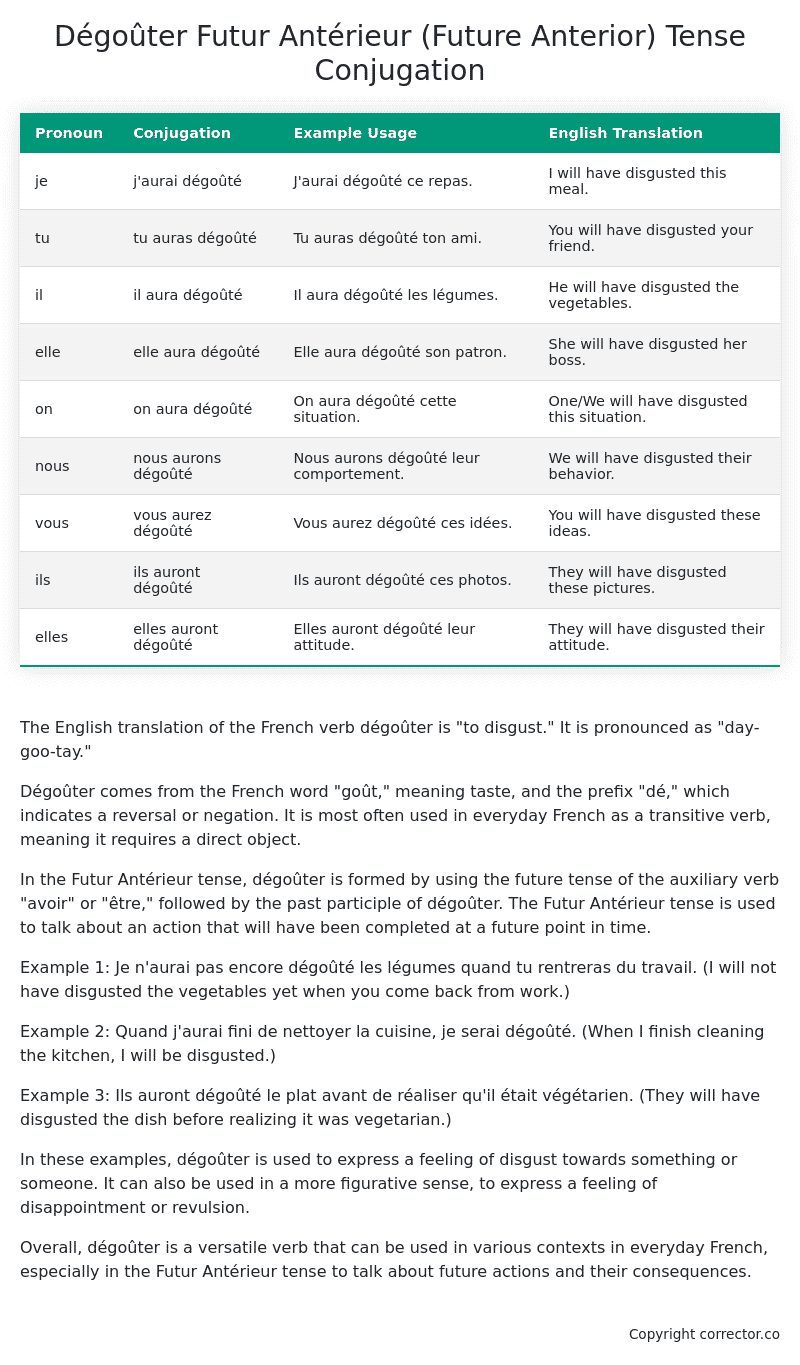Futur Antérieur (Future Anterior) Tense Conjugation of the French Verb dégoûter
Introduction to the verb dégoûter
The English translation of the French verb dégoûter is “to disgust.” It is pronounced as “day-goo-tay.”
Dégoûter comes from the French word “goût,” meaning taste, and the prefix “dé,” which indicates a reversal or negation. It is most often used in everyday French as a transitive verb, meaning it requires a direct object.
In the Futur Antérieur tense, dégoûter is formed by using the future tense of the auxiliary verb “avoir” or “être,” followed by the past participle of dégoûter. The Futur Antérieur tense is used to talk about an action that will have been completed at a future point in time.
Example 1: Je n’aurai pas encore dégoûté les légumes quand tu rentreras du travail. (I will not have disgusted the vegetables yet when you come back from work.)
Example 2: Quand j’aurai fini de nettoyer la cuisine, je serai dégoûté. (When I finish cleaning the kitchen, I will be disgusted.)
Example 3: Ils auront dégoûté le plat avant de réaliser qu’il était végétarien. (They will have disgusted the dish before realizing it was vegetarian.)
In these examples, dégoûter is used to express a feeling of disgust towards something or someone. It can also be used in a more figurative sense, to express a feeling of disappointment or revulsion.
Overall, dégoûter is a versatile verb that can be used in various contexts in everyday French, especially in the Futur Antérieur tense to talk about future actions and their consequences.
Table of the Futur Antérieur (Future Anterior) Tense Conjugation of dégoûter
| Pronoun | Conjugation | Example Usage | English Translation |
|---|---|---|---|
| je | j’aurai dégoûté | J’aurai dégoûté ce repas. | I will have disgusted this meal. |
| tu | tu auras dégoûté | Tu auras dégoûté ton ami. | You will have disgusted your friend. |
| il | il aura dégoûté | Il aura dégoûté les légumes. | He will have disgusted the vegetables. |
| elle | elle aura dégoûté | Elle aura dégoûté son patron. | She will have disgusted her boss. |
| on | on aura dégoûté | On aura dégoûté cette situation. | One/We will have disgusted this situation. |
| nous | nous aurons dégoûté | Nous aurons dégoûté leur comportement. | We will have disgusted their behavior. |
| vous | vous aurez dégoûté | Vous aurez dégoûté ces idées. | You will have disgusted these ideas. |
| ils | ils auront dégoûté | Ils auront dégoûté ces photos. | They will have disgusted these pictures. |
| elles | elles auront dégoûté | Elles auront dégoûté leur attitude. | They will have disgusted their attitude. |
Other Conjugations for Dégoûter.
Le Present (Present Tense) Conjugation of the French Verb dégoûter
Imparfait (Imperfect) Tense Conjugation of the French Verb dégoûter
Passé Simple (Simple Past) Tense Conjugation of the French Verb dégoûter
Passé Composé (Present Perfect) Tense Conjugation of the French Verb dégoûter
Futur Simple (Simple Future) Tense Conjugation of the French Verb dégoûter
Futur Proche (Near Future) Tense Conjugation of the French Verb dégoûter
Plus-que-parfait (Pluperfect) Tense Conjugation of the French Verb dégoûter
Passé Antérieur (Past Anterior) Tense Conjugation of the French Verb dégoûter
Futur Antérieur (Future Anterior) Tense Conjugation of the French Verb dégoûter (this article)
Subjonctif Présent (Subjunctive Present) Tense Conjugation of the French Verb dégoûter
Subjonctif Passé (Subjunctive Past) Tense Conjugation of the French Verb dégoûter
Subjonctif Imparfait (Subjunctive Imperfect) Tense Conjugation of the French Verb dégoûter
Subjonctif Plus-que-parfait (Subjunctive Pluperfect) Tense Conjugation of the French Verb dégoûter
Conditionnel Présent (Conditional Present) Tense Conjugation of the French Verb dégoûter
Conditionnel Passé (Conditional Past) Tense Conjugation of the French Verb dégoûter
L’impératif Présent (Imperative Present) Tense Conjugation of the French Verb dégoûter
L’infinitif Présent (Infinitive Present) Tense Conjugation of the French Verb dégoûter
Struggling with French verbs or the language in general? Why not use our free French Grammar Checker – no registration required!
Get a FREE Download Study Sheet of this Conjugation 🔥
Simply right click the image below, click “save image” and get your free reference for the dégoûter Futur Antérieur tense conjugation!

Dégoûter – About the French Futur Antérieur (Future Anterior) Tense
Construction
Common Everyday Usage Patterns
Interactions with Other Tenses
For example
Summary
I hope you enjoyed this article on the verb dégoûter. Still in a learning mood? Check out another TOTALLY random French verb conjugation!


